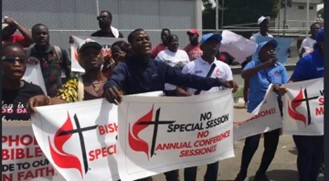The United Methodist Church (UMC) in Liberia is facing a significant schism, as over 12,000 members from five counties, primarily belonging to the Weala District Conference, have announced their departure from the denomination. This exodus stems from the global church’s adoption of a “Regionalization Plan,” which has sparked controversy and differing interpretations, particularly concerning its implications for LGBTQ+ inclusion. The Weala District Conference, encompassing a significant portion of the Liberian UMC, interprets regionalization as an acceptance of same-sex marriage and the ordination of gay and lesbian clergy, a stance they vehemently oppose. This perception has fueled their decision to break away, marking another chapter in the ongoing global debate within the UMC regarding LGBTQ+ rights.
The breakaway faction, representing approximately 41 churches within the Weala District Conference, formalized their decision through a five-count resolution presented at their annual conference in January 2025. The resolution explicitly cites the General Conference’s decision in Charlotte, North Carolina, as the catalyst for their departure, expressing their unwillingness to associate with any entity that permits the ordination and consecration of gay and lesbian individuals as clergy. This action underscores the deep divisions within the UMC and the significant challenges the denomination faces in navigating these complex and sensitive issues. The Weala District’s interpretation of the regionalization plan appears to conflate regional autonomy with an endorsement of practices they consider contrary to their religious beliefs.
The heart of the dispute lies in the differing interpretations of the Regionalization Plan. While the plan’s intent is to allow regional bodies greater autonomy in adapting their practices to local contexts, the Weala District Conference views it as a direct endorsement of same-sex marriage and LGBTQ+ ordination. This perception is at odds with Bishop Samuel Jerome Quire Jr.’s explanation of the plan, which emphasizes the customization of ministry practices based on cultural variations within different regions. Bishop Quire maintains that the plan does not explicitly condone same-sex marriage, and further asserts that the Liberian UMC will adhere to the traditional definition of marriage as a union between a man and a woman.
Bishop Quire, in his closing sermon at the Weala District Conference’s annual gathering, addressed the concerns raised by the departing members, urging them to remain within the church and not “walk away from God.” He clarified that as a bishop, he did not have voting rights when the decision on regionalization was made in the United States. Furthermore, he explained that while the definition of marriage was amended to include a broader interpretation, the Liberian UMC would continue to recognize marriage solely as a union between a man and a woman. Despite these reassurances and his plea for unity, the Weala District Conference remained resolute in their decision to separate.
The schism within the Liberian UMC reflects a broader struggle within the global denomination, grappling with the increasingly polarizing issue of LGBTQ+ inclusion. The different interpretations of the Regionalization Plan highlight the complexities of reconciling diverse beliefs and perspectives within a global religious organization. The Weala District’s departure underscores the significant challenges the UMC faces in maintaining unity while navigating these sensitive issues. Their decision also reflects a broader trend of denominational splits over LGBTQ+ issues within Christianity.
The future of the UMC in Liberia, and indeed globally, remains uncertain. The departure of a substantial portion of its membership in Liberia signifies the depth of the divide and the potential for further fragmentation. The challenge for the UMC is to find a way forward that respects the diverse views of its members while maintaining its core principles and mission. The events in Liberia serve as a microcosm of the larger struggle within the UMC, highlighting the urgent need for dialogue, understanding, and a path towards reconciliation. The breakaway group will likely form its own independent Methodist denomination, further diversifying the religious landscape of Liberia.


